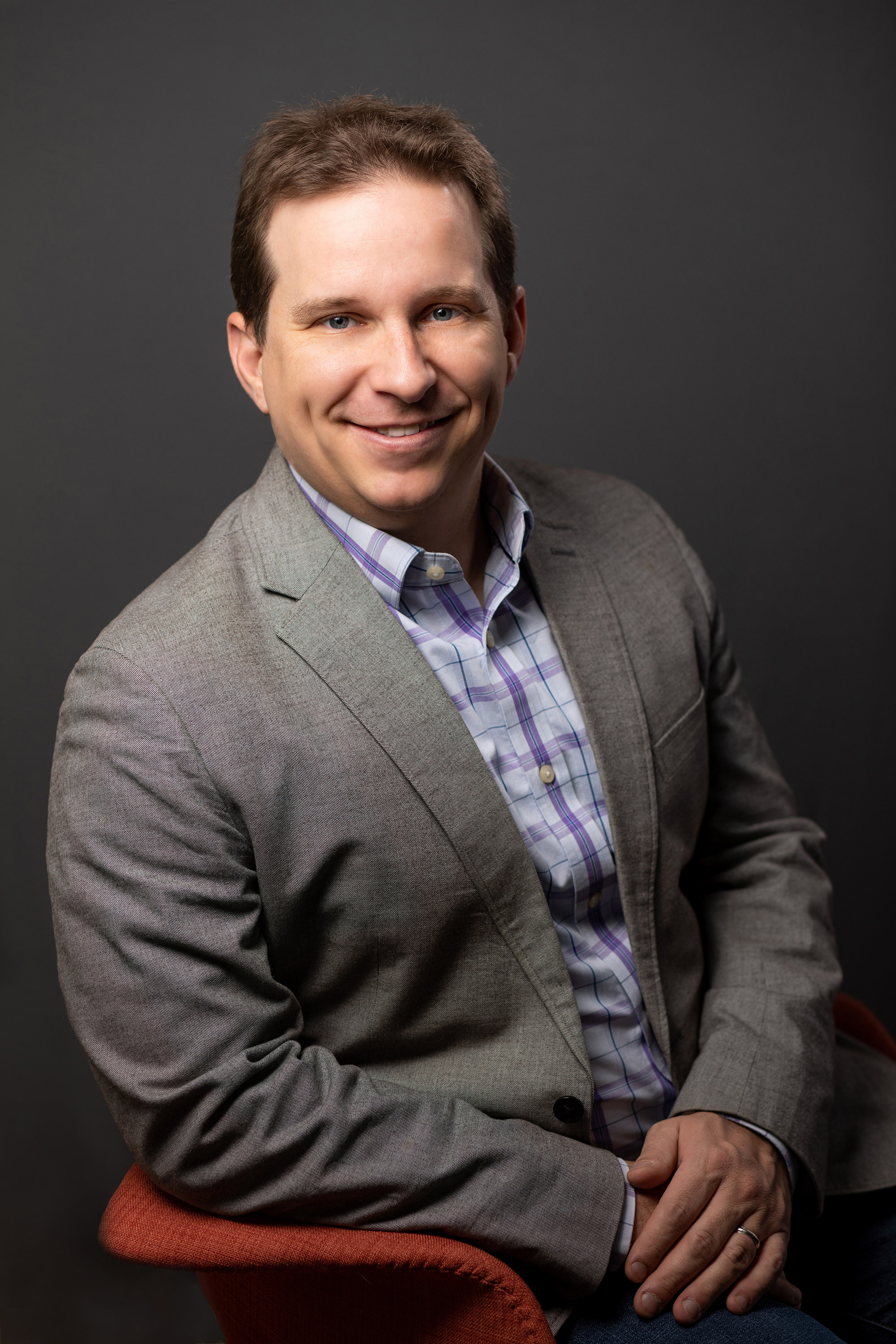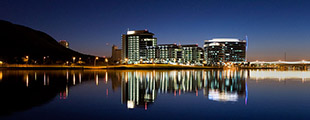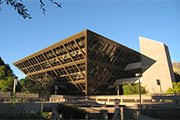-

Title: Robotic Martians: Orbiters, Landers, Rovers and a Half Century of Unmanned Exploration Speaker: Christopher S. Edwards
Associate Professor of Planetary Science
Northern Arizona University, AZ
Abstract: Humans have sent an armada of robotic explorers to Mars over the past several decades. These spacecraft have enabled countless scientific discoveries and revealed Mars a complex planetary body much like our own Earth. For example these spacecraft have revealed ancient aqueous processes on Mars, which have been explored in detail from orbit but also via landed platforms such as rovers. However getting to Mars is not without significant risk. Nearly half of all spacecraft never make it. In this talk, we’ll examine some of the recent findings by NASA missions, discuss some upcoming missions launched this summer and review some of the challenges of sending spacecraft to Mars, into orbit, and onto the surface.
Biography: Christopher S. Edwards is an Associate Professor of Planetary Science at Northern Arizona University. He is a science team member and instrument scientist for the Emirates Mars Infrared Spectrometer on the Emirates Mars Mission “Hope”, a participating scientist on the Mars Science Laboratory Curiosity Rover, a participating scientist on the OSIRIS-Rex mission to Bennu, a Co-Investigator on the Lunar Trailblazer mission and has worked on numerous other Mars missions including the 2001 Mars Odyssey Thermal Emission Imaging System, Mars Global Surveyor Thermal Emission Spectrometer, and the Mars Reconnaissance Orbiter Compact Reconnaissance Imaging Spectrometer for Mars. Edwards participated on these science and instrument teams while perusing his Ph.D. at Arizona State University, as the Planetary Science Postdoctoral Fellow at the California Institute of Technology, as a Research Scientist at the U.S. Geological Survey Astrogeology Science Center and now at NAU. His research focuses on the composition, physical properties and processes, and morphology of planetary surfaces, with an emphasis on rocky bodies including the Earth. A major element of his research has been the design and development of infrared remote sensing instruments for use in space, the laboratory and for fieldwork. His research uses infrared spectroscopy, radiometry, laboratory spectroscopic measurements, geologic field observations, and numerical modeling, and has taken him to field sites in the western U.S., Yellowstone, Hawaii, and Spain, as well as the Himalayan mountains of Bhutan.
-
Towards Efficient Vision Transformers Inference: A First Study of Transformers on Mobile Devices
Xudong Wang (Shanghai Jiao Tong University), Li Lyna Zhang (Microsoft Research), Yang Wang (Microsoft Research), Mao Yang (Microsoft Research)
-
Understanding the Potential of Server-Driven Edge Video Analytics
Qizheng Zhang (University of Chicago), Kuntai Du (University of Chicago), Neil Agarwal (Princeton University), Ravi Netravali (Princeton University), Junchen Jiang (University of Chicago)
-
A Neural-Based Bandit Approach to Mobile Crowdsourcing
Shouxu Lin (Carnegie Mellon University), Yuhang Yao (Carnegie Mellon University), Pei Zhang (University of Michigan), Hae Young Noh (Stanford University), Carlee Joe-Wong (Carnegie Mellon University)
-
Logic-based Intelligence for Batteryless Sensors
Abu Bakar (Northwestern University), Tousif Rahman (Newcastle University), Alessandro Montanari (Nokia Bell Labs), Jie Lei (Polytechnical University of Valencia), Rishad Shafik (Newcastle University), Fahim Kawsar (Nokia Bell Labs)
-
Towards Battery-Free Machine Learning and Inference in Underwater Environments
Yuchen Zhao (Imperial College London), Sayed Saad Afzal (MIT), Waleed Akbar (MIT), Osvy Rodriguez (MIT), Fan Mo (Imperial College London), David Boyle (Imperial College London), Fadel Adib (MIT), Hamed Haddadi (Imperial College London)
-
EarWalk: Towards Walking Posture Identification using Earables
Nan Jiang (National University of Singapore), Terence Sim (National University of Singapore), Jun Han (Yonsei University)
-
IntruSense: An Enhanced Physical Security System using UWB
Shrenik Changede, Ashutosh Dhekne (Georgia Institute of Technology)
-
A Seamless Second-Factor Verification as a Mobility-Service for Future Commute Stations
Harshvardhan Takawale (Silence Laboratories and SUTD), Jay Prakash (Silence Laboratories), Tony Q.S Quek (Silence Laboratories and SUTD)
-
Malicious mmWave Reconfigurable Surface: Eavesdropping through Harmonic Steering
Haoze Chen, Yasaman Ghasempour (Princeton University)
-

Title: The Metaverse, Augmented Reality and Magic Leap Speaker: David Chu
Vice President of Software Engineering at
Magic Leap
Abstract: What is the Metaverse? What are the key technologies to enable a compelling metaverse? Magic Leap has been working on this problem for the past decade. With a combination of rigorous hardware and software co-design, sensor-rich perception, state-of-the-art immersion, and lessons learned from the field, the forthcoming Magic Leap 2 system will be a key enabler for the Metaverse.
Biography: David Chu is Vice President of Software Engineering at Magic Leap. He was formerly with Google where he led teams on AR, VR, edge cloud, and game streaming. Prior to that, David was an Adjunct Associate Professor at the University of Illinois, Urbana-Champaign, and researcher at Microsoft Research. David's interests are in augmented reality, mobile computing, virtual reality, and applied machine learning. He received the Best Paper award in MobiSys 2015, the Best Paper nomination in MobiSys 2012, the Best Demo award in MobiSys 2014, and the Best Demo nomination in SenSys 2011. David's work has appeared in the media on several occasions, such as at: TechCrunch, PC Magazine, GameSpot, Ars Technia, Slashdot, The Verge, Engadget, Yahoo and Wired. David has served as the Program Committee Chair of ISMAR 2018 and NetGames 2017, and the General Chair of HotMobile 2016. He received a B.S. from the University of Virginia, and an M.S. and Ph.D. from UC Berkeley while an NSF Graduate Research Fellow.
-
Hybrid Mobile Vision for Emerging Applications
Nan Wu (George Mason University), Felix Xiaozhu Lin (University of Virginia), Feng Qian (University of Minnesota), Bo Han (George Mason University)
-
Incremental Perception on Real Time 3D Data
Arup Kumar Sarker, Felix Xiaozhu Lin (University of Virginia)
-
A Quantitative Analysis of System Bottlenecks in Visual SLAM
Sofiya Semenova (University at Buffalo), Steven Y. Ko (Simon Fraser University), Yu David Liu (SUNY Binghamton), Lukasz Ziarek (University at Buffalo), Karthik Dantu (University at Buffalo)
-
Balancing Privacy and Serendipity in Cyberspace
Mahadev Satyanarayanan (Carnegie Mellon University), Nigel Davies (Lancaster University), Nina Taft (Google)
-
Implementing GDPR for Mobile and Ubiquitous Computing
Carlos Bermejo Fernandez (Hong Kong University of Science and Technology), Tristan Braud (Hong Kong University of Science and Technology), Pan Hui (Hong Kong University of Science and Technology/University of Helsinki)
-
Reining in Mobile Web Performance with Document and Permission Policies
Byungjin Jun (Northwestern University), Fabián E. Bustamante (Northwestern University), Ben Greenstein (Google), Ian Clelland (Google)
-
Networked Beamforming in Dense mmWave WLANs
Ding Zhang (George Mason University), Panneer Selvam Santhalingam (George Mason University), Parth Pathak (George Mason University), Zizhan Zheng (Tulane University)
-
5G in the Sky: The Future of High-speed Internet via Unmanned Aerial Vehicles
Tianxiang Li (UCLA), Mohammad H. Mazaheri (University of Waterloo), Omid Abari (UCLA)
-
The Internet of Things Still Has a Gateway Problem
Thomas Zachariah, Neal Jackson, Prabal Dutta (University of California, Berkeley)








